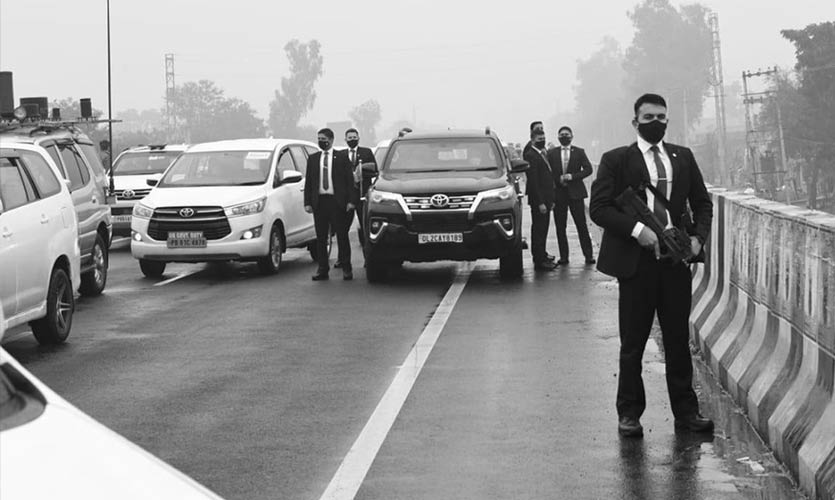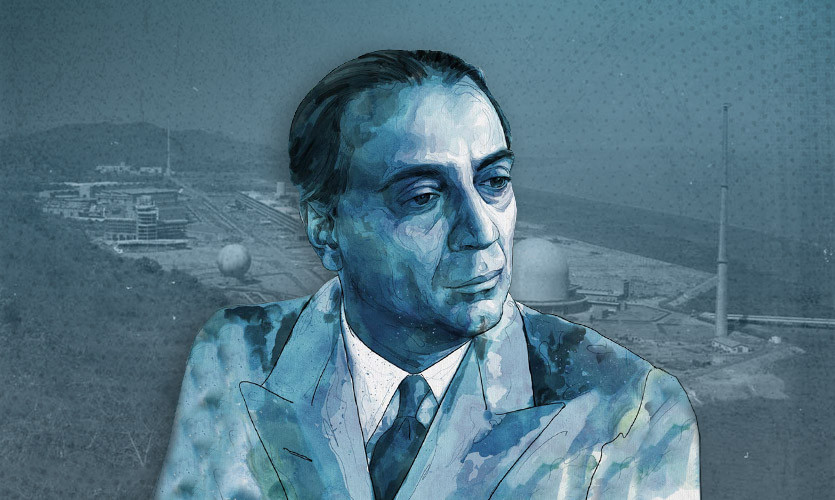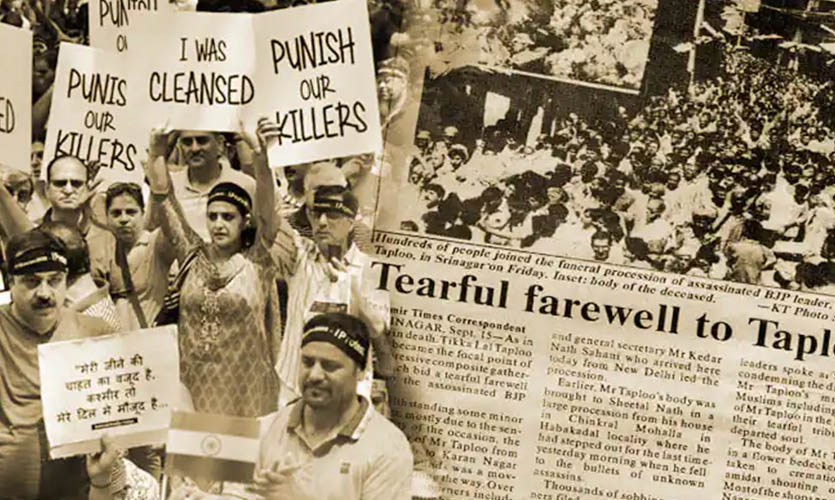In an unprecedent event, on January 5, Prime Minister Narendra Modi’s cavalcade was compromised during his visit to Punjab. The event has raised serious questions about adherence to security protocols, and disregard for the office he represents.
While media coverage since the incident is filled with details of the incident, opinions of political leaders and passing around the blame, social media is rife with some citizens making mockery of the issue.
But is it okay to let our political opinion supersede the gravity of India’s most powerful office?
Protocol
As per his itinerary, the prime minister was scheduled to travel to a political rally in Ferozepur, Punjab, the plan for which had been communicated to the state government in advance. Before addressing the rally, he was supposed to visit the National Martyrs Memorial in Hussainiwala. Since the weather conditions were not feasible for him to travel by air from the Bathinda Airport, he decided to make the journey by road. However, this was hindered as protestors, allegedly from the Bharatiya Kisan Union (BKU) Krantikari (Phul), formed a blockade over a flyover on the designated route, bringing the prime minister’s convoy to a halt for over 15 minutes. “Around 30 kms away from National Martyrs Memorial in Hussainiwala, when the Prime Minister’s convoy reached a flyover, it was found that the road was blocked by some protestors. The PM was stuck on a flyover for 15-20 minutes. This was a major lapse in the security of PM,” stated the home ministry. Reportedly, the prime minister’s cavalcade commenced its journey via road only after the required security arrangements were confirmed by the DGP Punjab Police.
According to standard protocol, when the Prime Minister of India is scheduled to make a visit anywhere within the country, at least one contingency route (if not more) is supposed to be chalked out beforehand. While the elite commando forces of the Special Protection Group (SPG) are responsible for the prime minister’s security round-the-clock, travel routes are secured by the local police. Paramilitary forces guard the routes and snipers are placed in any tall buildings that are located along them. An advanced security liaison (ASL) meeting is held between high-ranking officers of the Intelligence Bureau (IB), the SPG, and the local police at least a week in advance before the prime minister’s visit, and the logistics are finalised only after the SPG is satisfied. “Wasn’t the threat of protesters spilling on the roads discussed at this? If it was and yet the protesters came on the road, then the Punjab Police is at fault. Also, it would be interesting to see what the IB said in the meeting. Every security detail is planned on the basis of this meeting,” an officer told the Hindustan Times, on condition of anonymity.
“The sanitisation of the road is done 3-4 hours in advance. The PM’s visit was not an impromptu one. The local police had enough time to check for mobilisation in the villages nearby, especially in the backdrop of the recent farmers protest. The local police must sanitise the road and cannot make exceptions for even fire or ambulance vehicles to stop the convoy,” said another officer. Usually, there are two routes designated for travel by road – the main route and the contingency (C) route. “The routes are chosen in such a way that if there is a blockade on the main route, the convoy immediately takes a turn towards the C route… If there is a threat or a possible, disruption, the escort vehicles immediately take the second route, which is already sanitised in advance. And until the PM passes, no one is allowed on the route,” an officer formerly part of the PM’s security team told the media.
A former DGP told News18, “There is a designated vehicle for the DGP to travel in the PM cavalcade. In case he is not available, a designated officer must represent him so that in case of any exigencies, he or she can ensure that the PM’s cavalcade is not disrupted.” This was not followed. Another officer told the publication, “Sometimes an emergency situation might arise forcing a last-minute decision, otherwise route, deployment, etc, are all pre-decided by the state and shared with the SPG.”
Lapse And The Blame Game
Initially, on Wednesday, Health Minister Dr Mansukh Mandaviya communicated that the prime minister decided to cancel his visit to Ferozepur “due to some reasons”. The Ministry of Home Affairs explained the series of events and said, “Also in view of the contingency plan the Punjab Government has to deploy additional security to secure any movement by road, which were clearly not deployed. After this security lapse, it was decided to head back to Bathinda Airport.” It added, “The Ministry of Home Affairs (MHA) taking cognisance of this serious security lapse has sought a detailed report from the state government. The State Government has also been asked to fix responsibility for this lapse and take strict action.”
Baldev Singh Zira, state general secretary of the BKU Krantikari (Phul) who was present at the site, said that the Ferozepir SSP had informed them that the prime minister would be taking the route, but they did not take him seriously. “The Ferozepur SSP had come to inform us that the PM is taking this road, but we thought he was fibbing in order to disperse us. We were there to stop the BJP vehicles (on way to Ferozepur rally venue). Had we known that the PM was actually travelling on this route, our reaction would have been different… At the most, we may have sought two minutes with him on his way to Ferozepur,” said Zira. Noteworthy, Surjit Phool, president of BKU Krantikari was arrested in 2009 under the Unlawful Activities (Prevention) Act, 1967, for alleged Maoist links. According to sources, after Punjab DGP Siddharth Chattopadhyaya found out that the PM’s route had been disrupted, he had got in touch with senior officials of the state government and recommended “using force” to disperse the protesters. However, he was asked to exercise restraint.
BJP national president JP Nadda has alleged that Punjab CM Charanjit Singh Channi deliberately avoided SOS calls. CM Channi refuted the accusation and said, “As a Punjabi, I would die to protect you (the prime minister) … but there was no danger to his life. There was no security breach. He also said, “Today if someone held a peaceful protest on the PM’s way, it should not be linked to the PM’s security.” Women and Child Development Minister Smriti Irani said that it was the Congress party’s “murderous conspiracy to kill the PM”.
Since Punjab is a border state, the threat becomes exponential, especially given the involvement of Khalistani elements in the recent bomb blast at a Ludhiana court. According to sources, the key accused – Jaswant Multani, a member of the banned organisation Sikhs For Justice – was going to send explosive material to operatives in Punjab from Pakistan to carry out more terrorist activities. The site of the flyover where the prime minister’s convoy was stranded for over 15 minutes is within a proximity of 30 kms to the India’s border with Pakistan.
Why Is Politics Over The Matter Ill-Advised?
Indian Youth Congress national president Srinivas BV tweeted, “Modi ji, How’s the Josh?” While his tweet has been displayed repeatedly across news channels, the leader has claimed that his comment was regarding the empty chairs at the Ferozepur venue where the prime minister was scheduled to attend the rally. Even if this were true, the gravity of the matter seems to be lost on the opposition party, with most leaders jumping to misinformed defences. Moreover, despite denying a lapse on all platforms, Punjab CM’s office has already ordered a probe. According to an official spokesperson, a high-level committee comprising Justice (retd) Mehtab Singh Gill, Principal Secretary, Home Affairs, and Justice Anurag Verma will submit a report within three days.
“This committee formed by the Chief Minister will never be able to find out anything because he himself is the ringleader of this conspiracy,” said BJP state president Ashwani Sharma. He also met Punjab governor Banwarilal Purohit today with a six-member delegation and demanded the suspension of Punjab Deputy CM and Home Minister Sukhjinder Singh Randhawa and the DGP. Senior Advocate Maninder Singh has filed a petition to enquire into the security breach. The Supreme Court is expected to hear the matter tomorrow, with Chief Justice of India NV Ramana presiding.
The BJP government, on the other hand, has been accused of taking advantage of the situation and saving face from addressing a deserted venue.
While propaganda machinery, rallies and protests are in full swing during election season, dereliction of duty towards the protection of the Prime Minister of India is contemptuous. Additionally, our leaders would do well to remember that India does not enjoy the most peaceful geopolitical relations. Pakistan’s continued infiltration and failed efforts at de-escalation with China should be enough reasons for political parties to stand together and try to understand what went wrong, without resorting to mindless defences or blame games.
India is also currently chairing the Counter-Terrorism Committee of the UN Security Council. The country was also asked to chair the Taliban Sanctions Committee and the Libyan Sanctions Committee in 2021. If India wants to continue enjoying its elevated status among global powers and be part of defining security decisions, leaders at home should try to stop turning it into a banana republic and handle a serious internal security issue with care.
The Horus Eye is a weekly column written by Divya Bhan analysing current affairs and policies. This column does not intend or aim to promote any ideology and does not reflect the official position of The Sparrow.
Also read: Does The BJP Stand To Gain From Building Temples In The 2022 UP Election?










